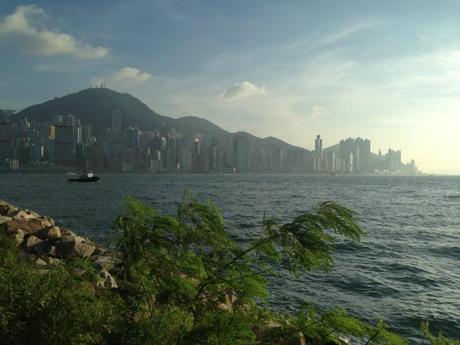
A couple of years ago, Hong Kong’s life expectancy was the highest in the world!!
Yep! The highest in the world!
On average, a dim-sum-dining local was destined to rack up 83.42 years!
Not a bad effort, given worldwide, the average life expectancy at birth was 67.88 years.
And just in case you didn’t know, women on average live longer than men in most countries, besides Tuvalu, Tonga, Kuwait and Qatar.
In 2012, Hong Kong women surpassed Japanese women in life expectancy rates for the first time in 26 years. The grand figure – 86.7 years!
So naturally, these highflying milestones got me thinking, what’s so special about Hong Kong? (Particularly given this newspaper report out recently, lamenting air pollution as the leading cause of cancer.)
Asia’s WORLD CITY it may be, but to use a really old quote by Benjamin Franklin, “just as the only things certain in life are death and taxes”….you can also be pretty certain there’s pollution in Hong Kong, by the truck load.
As enchanted as I am with the Fragrant Harbour, there are many days where it’s not quite so fragrant. Pollution here is a serious issue with visibility less than eight kilometres for 30 per cent of the year, which of course attracts its fair share of unwanted attention from around the globe.

And let’s not forget the ever increasing gap between the city’s rich and poor! On the surface, it doesn’t bode well for the average citizen to live a long healthy life, or does it?
I’m not going to harp on about the inequality or the pollution predicament….you can read more about it here though (if you so desire) in this previous post 50 Shades of Hong Kong Grey or in this post on Hong Kong, a City of Contradictions.
Today, I want to talk about why Hong Kong is one of the healthiest places to live, on the planet!
What are these people inhaling besides pollution and fumes from a lot of very fast cars?
Having skulked around these parts for a few years now, I’ve got a few good theories of my own going on (aside from those obvious ones the government likes to tout, such as a low birth rate and better medical treatment).
Of course the Chinese have a civilization that stems back thousands of years, so they’ve naturally had the upper hand when it comes to unravelling the mystery of longevity.
The saying goes, ‘if a man in China dies before 90, other people treat the death as early and tragic.’
I’m guessing that means you’re still a spring chicken until at least 70!
Experts say there’s no one single elixir, but perhaps it’s a healthy combination of the following?
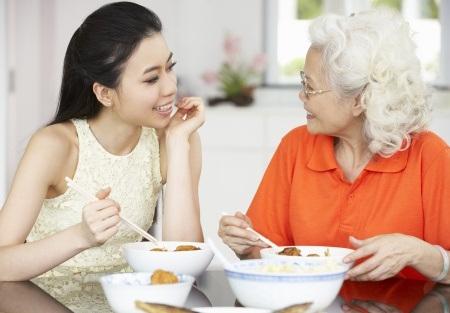
First things first, let’s talk about DIET.
One of the things that’s quite obvious when you arrive in Hong Kong is the small fact there are very few ‘big’ people.
To see someone who is overweight is a rarity, in fact, it’s such an anomaly, you can’t help but make comparisons with the western world when you do (let’s face it, these days to be obese, for a lot of people, is becoming the norm).
A report on obesity which put the US at the top and Australia 4th, has ranked Hong Kong so far down, it’s not even listed.
So what do we attribute this to?
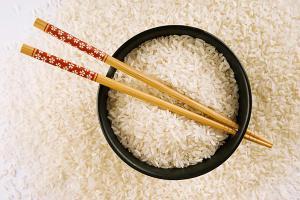
Nearly all of the protein Chinese consume is from plant sources, while 70% of what Americans eat comes from meat products. The simple facts are - heart disease and cancer cases in the US vastly outnumber those in China.
I’m starting to wonder if aside from oodles amounts of noodles, steamed fish, vegies, rice and congee — if the ingredients to long life also include things like drinking water warm instead of cold (which admittedly took me a couple of years to come to terms with) along with copious amounts of herbal tea and when I say copious I mean non-stop. Locals believe during a meal, your tea cup should never be empty.
(Which just quietly makes for an awful lot of bathroom stops.)
Salt and sugar is rarely used in authentic Chinese cooking and carbs like bread and potatoes, limited.
If you’re from the West, you may even notice the local’s ‘sweet tooth’ is diluted. Sure they are partial to a cake or dessert as much as the next person, but as a non-recovering chocoholic, I’ve gotta say, sweets ’round here are lacking a serious sugar hit!
But it looks like they’re having the last laugh – their unsweetened palates working in their flavour favour.
It’s not just about the food either, Chinese are quite specific about their utensils. Enter the ubiquitous chopsticks and porcelain spoons. Ancient mythology claims knives, cleavers and forks are to be left in the kitchen in case they undermine the fact that Chinese cooking is meant to be ‘humanizing’ as opposed to ‘brutish’ (not that I’m one to eat dinner with a meat cleaver).
Anyway, brutal utensils aside, all this brings me to Yin & Yang. 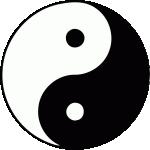
Black and White, Positive and Negative, Masculine and Feminine, the Chinese firmly believe ALL of life involves balancing these opposing forces.
When it comes to food, Yin favors feminine, damp, mild and cool elements while Yang is bright, masculine, dry and strong.
Its thought an imbalance of the two (natural “heat” and “cold” in the body) can cause disease or make you more conducive towards sickness. So if you’re getting a cold, when most of us in the Western world reach for a packet of Codral, here it’s all about miso soup with hot ginger… (at the very least you’ll be offered a glass of warm water).
Of course treating a cold or fever with a hot cup of chicken soup is an ancient and time honored tradition the world over, but Chinese believe certain soup has special healing powers.
Take Bird’s Nest Soup for example, it improves libido and digestion, alleviates asthma and increases focus, not to mention its overall benefit to the immune system and it gives you glowing skin (who needs beauty potions).
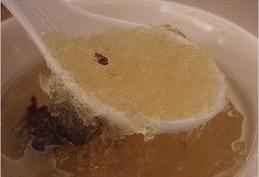
And let’s be real, how often do you see an Asian person with wrinkles? Like, almost never! (Trust me on this, I’ve observed!)
Other foods like Abalone shell fish are not only a status symbol but said to be an adjunct therapy for cancer and a brightener and healer for the eyes, increase appetite and a health food for the liver and kidneys.
Eczema sufferers will be warned to stay right away from garlic; Chinese black mushrooms eaten to help lower blood pressure and it goes on….for more on chinese food and traditions, check out my post Date with Destiny.
There’s even a saying from Chinese philosopher, Lao Tzu.
”The best physicians always treat disease when it is not [yet] a disease And so [their patients] are not ill.
So it seems the Chinese diet isn’t doing any harm in the health stakes…..but we all know Hong Kong is without a shred of doubt, a frenzied and fast paced city that never sleeps. To many, living in Hong Kong is perceived as a stressful way of life.
How do you stay calm amongst the madness of a city with multiple personalities?
A quick look out my window before 7am and it’s not uncommon to see people well into their seventies and eighties doing this…
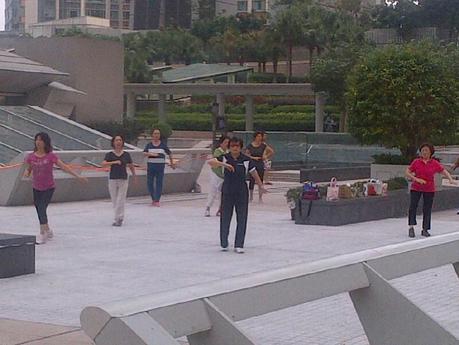
Every morning in parks and gardens around the city, you’ll see the slow moving, martial arts tradition of Tai Chi being practiced in earnest.
To be honest, to my untrained eye, this activity executed at snail’s pace has never looked all that ‘physical,’ but alas, these ancient and fluid movements are said to help balance the body’s internal yin and yang, doing as much for the mind and soul as for the body boosting cardiovascular strength.
With no statutory retirement age it’s also uncommon for locals to retire before the age of 70 or 80. This is often because with no pension they’re forced to earn a living, but maybe it’s also a case of “what doesn’t kill you makes you stronger!’
Hong Kong and much of Asia has a culture that doesn’t mind women carrying the load, physically and literally. It’s not unusual to see older women pushing extremely heavy loads through the city streets or hard at work on construction sites. As tough as it looks, these women are as tough as nails!
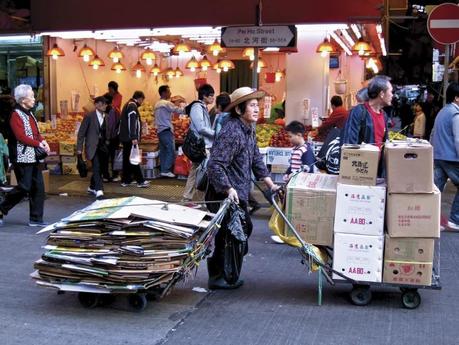
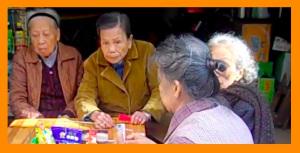
Ageing experts say the mentally stimulating tile game can help delay dementia by stimulating parts of the brain that controls memory and cognitive abilities.
You can’t accuse the Chinese of leading a sedentary lifestyle.
I also believe family ties, which are rich here in the Kong, play into the longevity equation. Family comes first and foremost (whether you like it or not) and it’s not uncommon for up to three or four generations to live under the one roof. Family care and support is crucial with Nursing home/Retirement Villages not an option for the elderly who (in general) are held in high regard by younger family members. Many studies have pointed to the fact that people who live alone die sooner.
Here’s the other thing, while Hong Kong has an extremely intense work ethic – six days a week, 16 hours a day….I suspect, maybe they’re combatting the stress with a little nap here and there. It’s not uncommon to see this….in public areas, a lot.
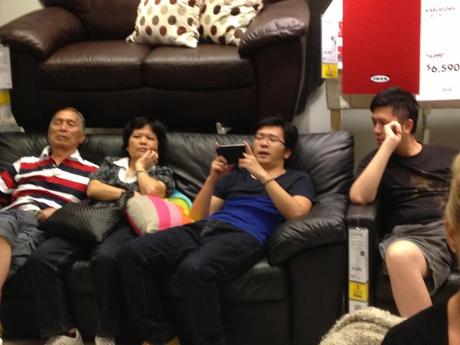
Taking a quick nap in Ikea furniture store, Hong Kong
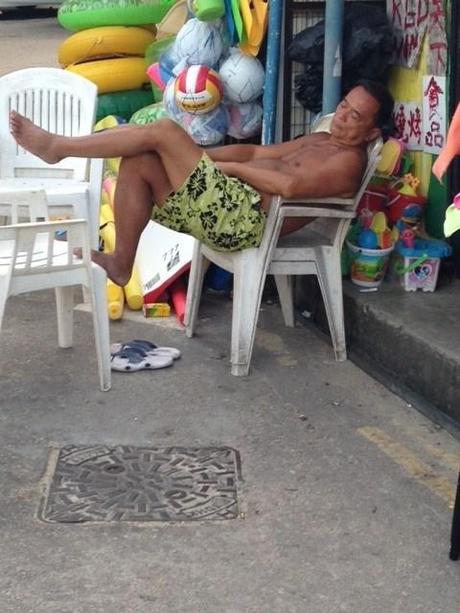
A quick nap outside his stall in Hong Kong
There’s also talk that such high density living has its plus side. Experts say the skyscraper island offers a balance of the fast paced with the super convenient.
Transport is slick, easy and cheap; shopping malls are underneath most high rises (which also takes care of the social side of life) and the shorter traveling time across the city which geographically has a small land mass of just over 1100 square km, allows Hong Kong people to carry out their daily activities with ease, thereby keeping them relatively healthy and quite possibly, low and behold, cheerful!
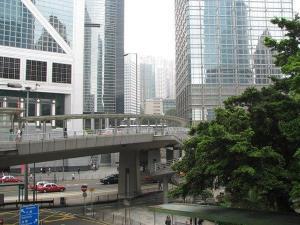
It’s not uncommon for most people to walk one or two kilometres a day (at least) and the walking pace is oh so much faster. This I can vouch for, having become an avid street walker myself (in the best sense of the term).
Like they say, a rolling stone gathers no moss!
Unlike countries such as Australia, where we have a love-hate relationship with the sun, Chinese people aren’t big fans of Mr Golden Sun. Preferring the paler look over the beach-bronzed goddess, they (sensibly) use umbrellas to shade themselves, even just walking down the street (which can make the fast paced street-march a tad difficult if you want to avoid a poke in the eye) and you’ll often find locals scurrying to the pool or beach once the sun goes down. No sun-worshippers here! (Which also means, NO wrinkles or skin cancer!)
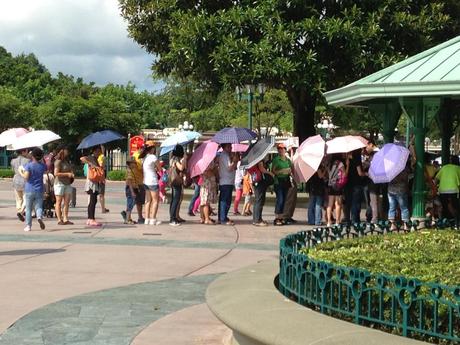
Somebody bring me some birds nest soup and an umbrella!
I’m also beginning to wonder just how much Feng Shui has to answer for in the longevity books.
According to ‘experts’ on the matter – having good Feng Shui is all about trying to create harmony and balance in your home or office. It is the practice of arranging your environment so that energy or “chi” flows gently and smoothly through your environment. If it’s not balanced just right, you could very well experience problems with your health, relationships, money or children. Beds, mirrors, even doors in the wrong place can cause all sense of havoc. Not even my husband can escape good Feng Shui in his work environment, with experts regularly visiting to “sort” out hotel space, not to mention his office! (A vase with water strategically added here, a blind pulled down here to stop the luck escaping out the glass window – in the world of Feng Shui, believe you me, you can’t afford to get it wrong.)
The humble tortoise is considered a symbol of longevity, thus its presence in any shape or form is coveted by many people who wish to live long, healthy lives. If it’s a live tortoise, even better, it will ensure the family lives to a ripe old age!
So in this global junction where east meets west, perhaps it’s time to take a (herbal) leaf out of the Chinese book of life!
Tai Chi, a tortoise, a cup of tea and a public nap….anyone?
*Just for the record, according to the latest release of CIA’s World Factbook, the world’s longest living people are currently found in Monaco, with an average age of 89.5 years.You Might Also Like
- 12 reasons you know you’ve been EXPATIFIED in Hong Kong…
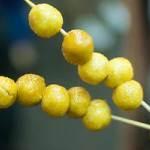
- Design of the times…
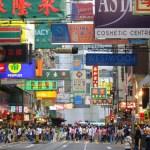
- 50 Shades of Hong Kong Grey….
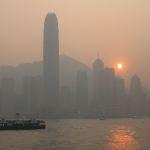
- Is Online Shopping the New Black?

- Bio
- Latest Posts

Nicole Webb
A Journalist, Nicole worked for Sky News Australia for a decade as a News Reader / Reporter / Producer. After ten years on the box, she decided to look outside the box and with her hotelier husband made the life-changing decision to live in Hong Kong - the city that never sleeps! Just as well, because she didn't get much sleep either with new babe in tow. Emerging from a sleep-deprived bubble, Nicole has reinvented herself as a freelance Writer, Copywriter, Presenter, Media Consultant and Master of Ceremonies...and best of all - Blogger! Check out Mint Mocha Musings for plenty of intriguing, humorous and uplifting tales from her expat life in Asia so far. You can also find her on Twitter: @nicoledwebb.
Latest posts by Nicole Webb (see all)
- Why Hong Kong’s outliving the rest of the world… - December 1, 2013
- Moving to Hong Kong – 10 things you shouldn’t leave home without! - November 10, 2013
- Is Online Shopping the New Black? - October 30, 2013





